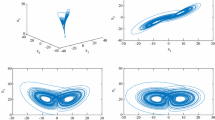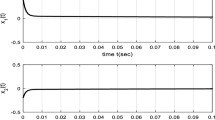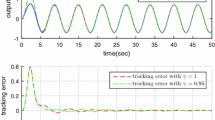Abstract
This study examines the stabilization control problem for Fractional-order nonlinear systems (FONS). Based on the frequency distribution model of the fraction-order integrator, a sufficient stability condition is presented for the Riemann-Liouville FONS. The stability of the FONS is proven using Lyapunov stability theory. An improved sufficient stability condition is also proposed with Linear matrix inequalities (LMIs) techniques. A novel control law to stabilize the FONS is put forward. Numerical simulation examples are provided to verify the proposed approaches.
Similar content being viewed by others
References
I. Podlubny, Fractional differential equations: An introduction to fractional derivatives, fractional differential equations, to methods of their solution and some of their applications, Academic press (1998).
N. H. T. Lemes, V. A. Simpao and J. P. C. dos Santos, A speculative study of non-linear Arrhenius plot by using fractional calculus, Physics. chem-ph (2016).
D. Baleanu, Z. B. Güvenç and J. A. Tenreiro Machado, New trends in nanotechnology and fractional calculus applications, Springer Science+Business Media B.V. (2010).
A. S. Sheoran, K. K. Kalkal and S. Deswal, Fractional order thermo-viscoelastic problem with temperature dependent modilis of elasticity, Mechanics of Advanced Materials and Structures (2015).
B. Ducharne, B. Zhang, D. Guyomar and G. Sebald, Fractional derivative operators for modeling piezoceramic polarization behaviors under dynamic mechanical stress excitation, Sensors and Actuators. A: Physical (2013).
M. Ichise, Y. Nagayanagi and T. Kojima, An analog simulation of noninteger order transfer functions for analysis of electrode process, J. Electroanal. Chem., 33 (1971) 253–265.
J. A. Stratton, Electromagnetic theory, John Wiley & Sons (2007).
N. Laskin, Fractional market dynamics, Physica A: Statistical Mechanics and its Applications, 287 (2000) 482–492.
D. Kusnezov, A. Bulgac and G. D. Dang, Quantum levy processes and fractional kinetics, Phys. Rev. Lett., 82 (1999) 1136–1139.
J. C. Trigeassou et al., Modelling and identification of a non-integer order system, ECC’99 European Control Conference, Karlsruhe, Germany 1999 2453–2458.
J. C. Trigeassou and N. Maamri, State-space modelling of fractional differential equations and the initial condition problem, IEEE SSD’09, Djerba, Tunisia 2009 1–7.
J. C. Trigeassou and N. Maamri, The initial conditions of Riemman-Liouville and Caputo derivatives: An integrator interpretation, Proceeding of the FDA’2010 Conference, October, Badajoz, Spain (2010).
J. C. Trigeassou and N. Maamri, Initial conditions and initialization of linear fractional differential equations, Signal Processing, 91 (3) (2011) 427–436.
J. Sabatier et al., On a representation of fractional order systems: Interests for the initial condition problem, Proceeding of the 3rd IFAC workshop on Fractional Differentiation and its Applications, Ankara, Turkey 2008 5–7.
H. Li, W. Yan and Y. Shi, Continuous-time model predictive control of under-actuated spacecraft with bounded control torques, Automatica, 75 (2017) 144–153.
J. Sabatier, M. Merveillaut, R. Malti and A. Oustaloup, How to impose physically coherent initial conditions to a fractional system?, Communications in Nonlinear Science and Numerical Simulation, 15 (2010) 1318–1326.
J. Sabatier, M. Merveillaut, L. Feneteau and A. Oustaloup, On observability of fractional order systems, Proceedings of the ASME IDET-CIE Conferences, San Diego, California, USA 2009 253–260.
J. Sabatier, C. Farges, M. Merveillaut and L. Feneteau, On observability and pseudo state estimation of fractional order system, European Journal of Control, 18 (2012) 260–271.
T. Poinot and J. C. Trigeassou, A method for modelling and simulation of fractional systems, Signal Processing, 83 (2003) 2319–2333.
J. Lin, T. Poinot and J. C. Trigeassou, Parameter estimation of fractional systems: Application to the modelling of a leadacid battery, Proceeding of the 12th IFAC Symposium on System Identification, SYSID 2000, USA (2000).
X. Tang, Y. Shi and L. Wang, A new framework for solving fractional optimal control problems using fractional pseudospectral methods, Automatica (accepted for publication).
J. Lin, Modélisation et identification des systèmes d’ordre non entier, Thèse de doctorat, Université de Poitiers, France (2001).
J. Lin, T. Poinot and J. C. Trigeassou, Parameter estimation of fractional systems. Application to heat transfer, European Control Conference ECC 2001, Porto Portugal 2001 2644–2649.
T. Poinot and J. C. Trigeassou, Parameter estimation of fractional models: Application to the modelling of diffusive systems, 15th IFAC World Congress, Barcelona, Spain (2002).
J. C Trigeassou, N. Maamri, J. Sabatier and A. Oustaloup, A Lyapunov approach to the stability of fractional differential equations, Signal Processing, 91 (2011) 437–445.
Y. Li, Y. Q. Chen and I. Podlubny, Mittag-Leffler stability of fractional order nonlinear dynamic systems, Automatica, 45 (8) (2009) 1965–1969.
S. J. Sadati, D. Baleanu, D. A. Ranjbar, R. Ghaderi and T. Abdeljawad, Mittag-Leffler stability theorem for fractional nonlinear systems with delay, Abstract Appl. Anal. 108 (2010) 651–1-7.
X. J. Wen, Z. M. Wu and J. G. Lu, Stability analysis of a class of nonlinear fractional-order systems, IEEE Trans. Circuits Syst. II, Exp. Briefs, 55 (11) (2008) 1178–1182.
W. H. Deng, Smoothness and stability of the solutions for nonlinear fractional differential equations, Nonlinear Anal. TMA, 72 (3/4) (2010) 1768–1777.
A. E. Matouk and A. A. Elsadany, Achieving synchronization between the fractional-order hyperchaotic Novel and Chen systems via a new nonlinear control technique, Applied Mathematics Letters, 29 (2014) 30–35.
M. Srivastava et al., Anti-synchronization between identical and non-identical fractional-order chaotic systems using active control method, Nonlinear Dyn., 76 (2014) 905–914.
L. Chao and X. Wang, Chaos in the fractional-order complex Lorenz system and its Synchronization, Nonlinear Dyn., 71 (2013) 241–257.
G.-C. Wu and D. Baleanu, Chaos synchronization of the discrete fractional logistic map, Signal Processing, 102 (2014) 96–99.
G. Si, Z.-Y. Sun and Y.-B. Zhang, A general method for synchronizing an integer-order chaotic system and a fractional-order chaotic system, Chin. Phys. B, 20 (8) (2011) 080505–1-7.
D. Heleschewitz and D. Matignon, Diffusive realizations of fractional integro-differential operators: structural analysis under approxi-mation, Conference IFAC, System, Structure and Control, Nantes, France, 2 (1998) 243–248.
G. Montseny, Diffusive representation of pseudo differential time operators, Proc. ESSAIM 5 (1998) 159–175.
Author information
Authors and Affiliations
Corresponding author
Additional information
Recommended by Associate Editor Yang Shi
Keyong Shao is currently a Pofessor in School of Electrical and Information Engineering, Northeast Petroleum University. He was born in Huainan, Henan Province, China in 1970. He received his B.E. degree from Daqing Northeast Petroleum Institute in 1992, his M.E. degree from Northeast University, Shenyang, China, in 2000, his Ph.D. in Control Theory and Control Engineering from Northeast University, Shenyang, China, in 2003. His main research interests include robust control and fractional-order system theory.
Lei Zuo is currently a Ph.D. candidate in School of Marine Science and Technology, Northwestern Polytechnical University, China. He received his B.Eng. degree from NWPU in 2011 and directly began his Ph.D. program in Control Theory and Control Application. He is interested in adaptive control, coverage control and optimization. His current research interests are focus on the coverage control for underwater vehicles in unknown environment.
Rights and permissions
About this article
Cite this article
Shao, K., Zuo, L. Sufficient stability condition for fractional-order nonlinear systems. J Mech Sci Technol 31, 3531–3537 (2017). https://doi.org/10.1007/s12206-017-0641-z
Received:
Revised:
Accepted:
Published:
Issue Date:
DOI: https://doi.org/10.1007/s12206-017-0641-z




